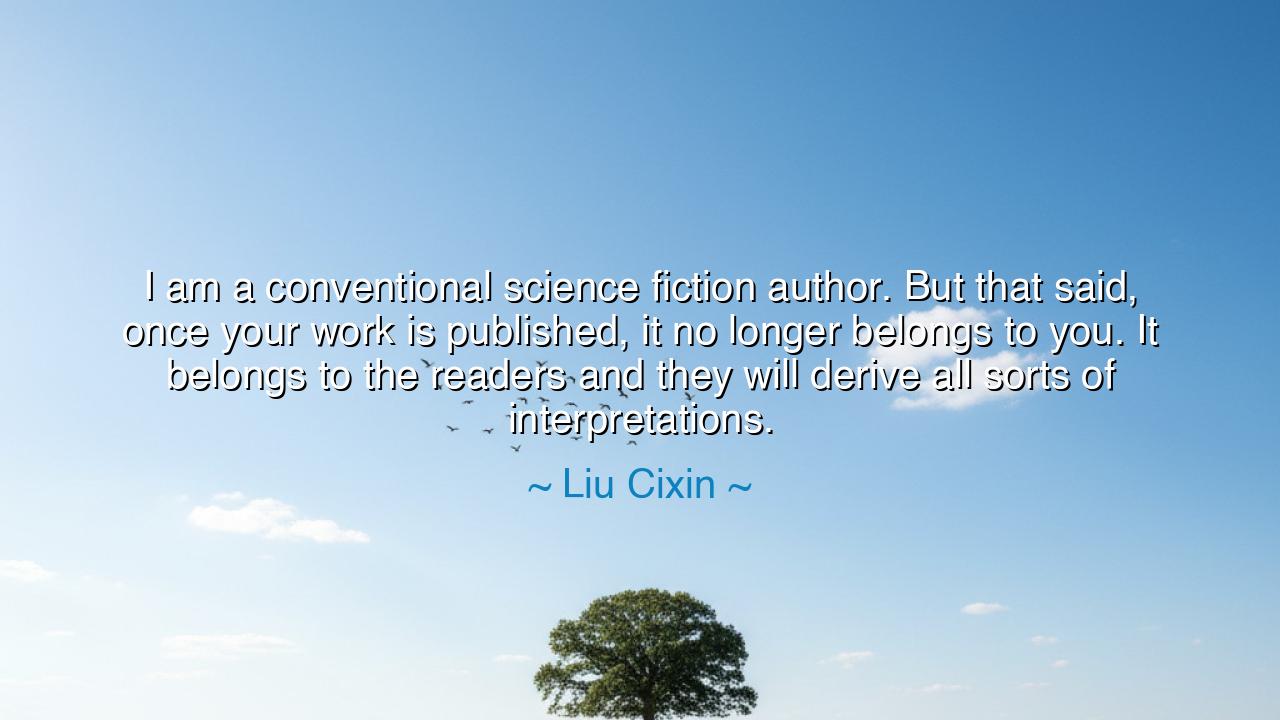
I am a conventional science fiction author. But that said, once
I am a conventional science fiction author. But that said, once your work is published, it no longer belongs to you. It belongs to the readers and they will derive all sorts of interpretations.






In the ancient halls of wisdom, where great thinkers and philosophers once gathered, there was a truth that reverberated through their debates: once a thought is shared, it takes on a life of its own. Liu Cixin, a master of the science fiction genre, acknowledged this profound reality in his words: "I am a conventional science fiction author. But that said, once your work is published, it no longer belongs to you. It belongs to the readers and they will derive all sorts of interpretations." These words speak not just to the writer’s craft but to the nature of art, creation, and interpretation itself. They remind us that once we share our creations with the world, they are no longer ours alone, but become part of the shared human experience.
In the same way that the ancient philosophers passed down their teachings, so too do the works of artists, writers, and creators shape the future. They are gifts to humanity, offered freely to those who wish to receive them. Yet, as Cixin wisely points out, once these works are shared, they take on a new life in the minds of those who encounter them. A story, once written, is no longer confined to the author's intent. It becomes an experience, a journey that each reader embarks upon, bringing with them their own thoughts, perspectives, and interpretations.
The great poets of antiquity, such as Homer, knew this well. The Iliad and The Odyssey, though penned by the hand of one man, have been passed down through the ages, each generation finding new meaning in them. The stories have been reimagined, adapted, and reinterpreted countless times, each interpretation shaped by the cultural context and the perspectives of those who engaged with them. Cixin’s words echo this ancient truth: the power of art is in its ability to evolve and grow, to live in the hearts and minds of those who experience it.
Consider, O children of the future, the works of Shakespeare, whose plays continue to resonate across time and space. His words were meant for the stage of his own time, yet they have found new meanings in every era. Each performance, each reading of his plays, brings forth new interpretations, new understandings of the human condition. A character like Hamlet, once a prince of Denmark, has become a symbol for all who struggle with existence, doubt, and action. In this way, Shakespeare’s work does not belong to him alone; it belongs to humanity, to the generations that have given it life again and again.
So too is it with the works of science fiction. Authors like Liu Cixin, who venture into the uncharted territories of imagination, create not just stories but worlds. These worlds, once opened to the public, take on a life of their own, transforming with every reader’s mind. A novel like The Three-Body Problem, while a product of Cixin’s creative vision, grows and evolves with each reader's engagement, each person’s unique experience with its concepts. What was once Cixin's creation becomes a shared journey, one that is marked by infinite paths of interpretation, each leading to new insights and ideas.
In Cixin's reflection, we are reminded that creation is an act of giving—a selfless act, where the creator offers their work to the world with the understanding that it will take on its own shape. It is no longer in the hands of the author, but in the minds of those who receive it. This is the great power of human creativity: once it is shared, it transcends the creator and becomes part of the universal experience. It is no longer about ownership, but about contribution to the greater whole of human knowledge and understanding.
The lesson for us, O children of the future, is clear: what we create is not simply for ourselves. Our ideas, our art, our words, are meant to live beyond us. They are meant to be shared, interpreted, and understood in new and dynamic ways by those who come after us. Whether in writing, in art, or in any other form of creation, we must be ready to offer our works to the world and allow them to evolve. Do not fear that your creations will be misunderstood, for it is the very act of sharing them that brings them to life. The future will take your thoughts, your dreams, and give them new meaning, just as every generation before has done with the works of those who came before them. Create boldly, for once you offer your work to the world, it becomes something greater than yourself—a gift to the ages, a thread in the eternal tapestry of human creativity.






AAdministratorAdministrator
Welcome, honored guests. Please leave a comment, we will respond soon